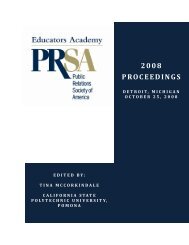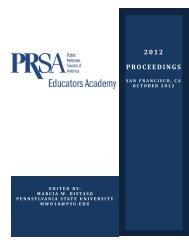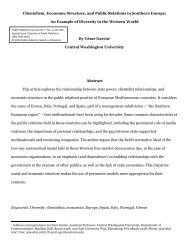2010 - Public Relations Society of America
2010 - Public Relations Society of America
2010 - Public Relations Society of America
Create successful ePaper yourself
Turn your PDF publications into a flip-book with our unique Google optimized e-Paper software.
examples to add depth and understanding, and compared responses to expectations based on<br />
other studies. Pseudonyms were assigned to all participants quoted in the study.<br />
Results<br />
Credibility <strong>of</strong> Independent Media vs. Controlled Media<br />
The existence <strong>of</strong> implied third-party endorsement effects <strong>of</strong> independent media stemming<br />
from perceived credibility <strong>of</strong> independent media compared to controlled media was supported<br />
overall by the interviews conducted with both public relations practitioners and business people.<br />
Nine <strong>of</strong> the 10 public relations practitioners interviewed said they definitely perceive<br />
independent media to be more credible than controlled media, and one person found independent<br />
media somewhat more credible than controlled media. Seven said that they thought business<br />
people definitely perceive independent media as more credible than controlled media, and three<br />
said that business people view independent media somewhat more credible than controlled<br />
media. PR practitioners said the general public does not feel as strongly about the credibility <strong>of</strong><br />
independent media compare to controlled media. Four said that the public definitely views<br />
independent media as more credible than controlled media; four said the public sees independent<br />
media somewhat more credible than controlled media; and two said the public does not<br />
distinguish any difference in credibility <strong>of</strong> independent media and controlled media.<br />
Eight <strong>of</strong> the 10 business people interviewed said they definitely perceive independent<br />
media as more credible than controlled media, while two found independent media somewhat<br />
more credible than controlled media. Six <strong>of</strong> the business people said that other business people<br />
definitely perceive independent media as more credible than controlled media, three said that<br />
business people view independent media somewhat more credible than controlled media, and<br />
one said that business people do not distinguish any difference in credibility <strong>of</strong> independent<br />
media and controlled media. Seven <strong>of</strong> the business people said the general public definitely or<br />
somewhat views independent media as more credible than controlled media, and three said that<br />
the public perceives independent media and controlled media as having the same level <strong>of</strong><br />
credibility.<br />
<strong>Public</strong> <strong>Relations</strong> Practitioners’ Views on Credibility <strong>of</strong> Independent and Controlled Media<br />
Interestingly, some PR pr<strong>of</strong>essionals perceived greater credibility <strong>of</strong> independent sources<br />
because they recognized the advocacy role they play in their own work. Independent PR<br />
practitioner Barbara said,<br />
Part <strong>of</strong> my job is to put people in the best possible light. Not being dishonest, but just<br />
playing up their strengths. Ideally a good newspaper or radio, television and other media<br />
outlets are digging to get at the actual facts <strong>of</strong> the situation. So that gives more credibility.<br />
An assumption that editors and reporters are unbiased whereas companies are biased was another<br />
explanation for perceiving higher credibility <strong>of</strong> media. Marketing communications pr<strong>of</strong>essional<br />
Jill observed that reporters are considered to have no bias, while a company that puts out an<br />
advertisement obviously has a self-interested perspective it wishes to advance. Because the<br />
controlled message is "scripted and approved," it lacks the credibility conveyed by a message<br />
communicated through an independent third-party channel, said strategic communications<br />
consultant Greg.<br />
A number <strong>of</strong> public relations pr<strong>of</strong>essionals noted a cynicism toward and resistance to<br />
messages designed to “sell” or “persuade.” Wayne, a corporate communications executive,<br />
observed, “It makes sense that when people see advertising over the course <strong>of</strong> their lives, they<br />
become more cynical about it… and they think about the fact that they are being sold to.” He<br />
added that people consume news media and advertising differently and are less cynical about<br />
68
















